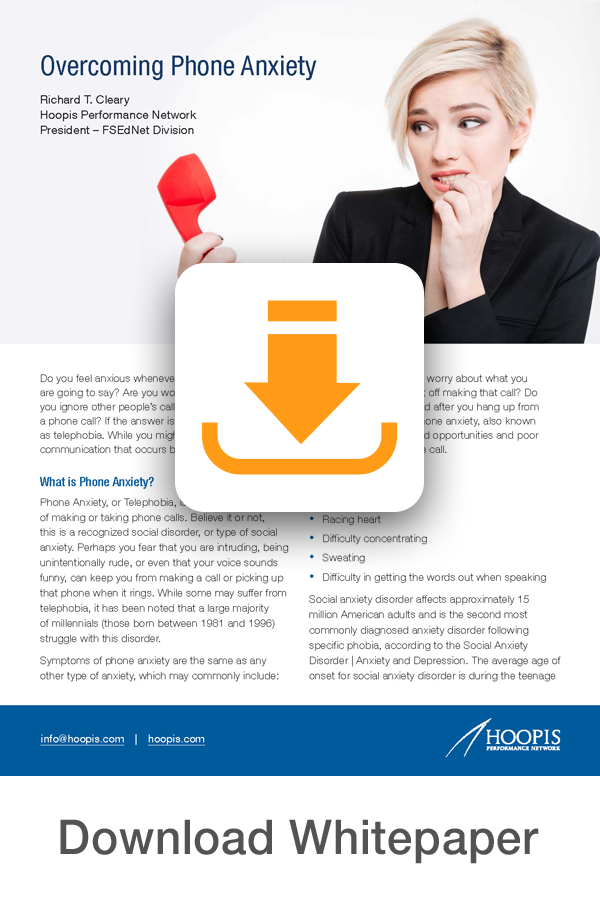Overcoming Phone Anxiety

Do you feel anxious whenever your phone rings or you must call someone? Do you worry about what you are going to say? Are you worried about embarrassing yourself, so you avoid or put off making that call? Do you ignore other people’s calls? Do you constantly replay conversations in your head after you hang up from a phone call? If the answer is yes to any of these questions, you may suffer from phone anxiety, also known as telephobia.
While you might think that this isn’t a problem, there are many missed opportunities and poor communication that occurs because of one’s hesitation to answer or make a phone call.
What is Phone Anxiety?
Phone Anxiety, or Telephobia, is a reluctance or fear of making or taking phone calls. Believe it or not, this is a recognized social disorder, or type of social anxiety. Perhaps you fear that you are intruding, being unintentionally rude, or even that your voice sounds funny, can keep you from making a call or picking up that phone when it rings. While some may suffer from telephobia, it has been noted that a large majority of millennials (those born between 1981 and 1996) struggle with this disorder.
Symptoms of phone anxiety are the same as any other type of anxiety, which may commonly include:
- Panic attacks
- Shaking
- Racing heart
- Difficulty concentrating
- Sweating
- Difficulty in getting the words out when speaking
Social anxiety disorder affects approximately 15 million American adults and is the second most commonly diagnosed anxiety disorder following specific phobia, according to the Social Anxiety Disorder | Anxiety and Depression. The average age of onset for social anxiety disorder is during the teenage years. Although individuals diagnosed with social anxiety disorder commonly report extreme shyness in childhood, it is important to note that this disorder is not simply shyness.
The Phone Anxiety Paradox
Considering the fact that 85% of Americans own smartphones in 2019, according to the Global Mobile Consumer Survey, phone anxiety is one of the great paradoxes of today’s world. According to a recent Gallup poll, nearly half of all smartphone users can’t even imagine life without their phone. We adore our smartphones, carrying them everywhere with us, sleeping with them, and touching them an average of 2,617 times a day. More intense users are touching their phones as many as 5,427 times a day. This is interesting considering many are avoiding the actual thing phones were created for – phone calls.
Why Do People Suffer from Phone Anxiety?
The common reasons that people suffer from phone anxiety can be lumped into inexperience, pressure, and insecurity. Let’s take a closer look at each of these.
Inexperience is a simple and understandable reason as to why someone may experience phone anxiety. We live in an era where people tend to text more than they talk on their mobile devices, so when the phone rings, those with phone anxiety may become hesitant simply due to unfamiliarity. Too often, when one begins a sales career, he or she is simply given a phone and a sales script of what to say, but most are not trained in understanding the phone calling process and its various techniques.
Pressure and stress are other reasons people suffer from phone anxiety. When texting, if you run out of things to say, or are unsure of how to respond, you can simply stop replying. This option doesn’t exist when talking to someone over the phone. Many people feel the need to try to keep conversations going, but when they inevitably fade, and periods of silence develop, some may begin to feel uncomfortable as awkwardness ensues. After experiencing situations like this, those afflicted with phone anxiety will begin to encounter symptoms of the disorder every time their phone rings.
Insecurity in not being able to see the other person is another excuse for phone anxiety. While the exact percentage is impossible to determine because of varying situations, experts agree that approximately 90% of our communication is nonverbal. When we engage in conversations, many elements are factored in, as our brains work to decipher not only what they are saying, but what they mean. Some of these elements include tone of voice, fluidity of words, mannerisms, eye contact, physiological behavior (i.e., sweating and scratching), and much more. When we talk to people over the phone, we are losing the majority of the indicators that help us communicate efficiently. This plays a major role in the development and triggering of phone anxiety, because the ability to gauge how our words are being interpreted, greatly diminishes, which makes those who suffer from social anxiety insecure about conversing through their mobile devices.
Millennials and Phone Anxiety
Many millennials struggle with mental health, and their generation has been dubbed as the “anxious generation.” Whether you are a millennial suffering with phone anxiety or trying to get ahold of a millennial with phone anxiety, it can help to understand the possible root causes and reasons for the cold shoulder.
A survey from gadget retail site BankMyCell attempts to delve into why many millennials love their phones but hate talking on them. The top reasons for a millennial not to answer an incoming phone or reach out to you with an email or text instead of calling you include:
- Calls can be time-consuming. You have no way to tell if a call will take minutes or hours. Millennials want to communicate faster and prefer getting straightforward answers.
- Calls are disruptive. In most cases, your phone will vibrate with a call at a random time of the day, potentially interrupting whatever activity you’re doing if you answer.
- Calls come off presumptuous. Overall, when someone calls you it’s probable that they need something from you. There is an assumption that you have the time to be interrupted. One millennial told the Wall Street Journal, “Calling someone without emailing first can make it seem as though you’re prioritizing your needs over theirs.”
- Calls are commonly inefficient. When you’re using a messaging service, you can drop in and out when you want. Sending an email or message via an app gets straight to the point without any polite small talk.
- Calls can be annoying. Getting a presumptuous call from someone creates a negative reaction. People often sigh or roll their eyes when a call comes in at an inconvenient time.
- Calls are stressful. Everyone is so productivity driven that in many situations like work, calls can be stressful. You could be working on a deadline or rushing to get out the door and the distraction interrupts you at the wrong time.
- People like to avoid conflict. Calls leave you little time to compose yourself. You can feel vulnerable about how you come across and what you’re going to say if confronted.
- Calls are rarely private. You can message nonstop in a room and no one will know what you’re saying. If you want a degree of privacy on the phone, you’ll have to relocate yourself to stop people from eavesdropping.
How Phone Anxiety Affects Your Life
As our phones become a bigger and more important part of our personal lives, as well as our professional lives, a sufferer of phone anxiety may risk important relationships when they ignore or avoid phone calls. Whether it’s a friend, family member, a colleague, or a client, some people may take the avoidance as a sign that you don’t want to speak with them. This can greatly affect relationships with those individuals.
If you have or are planning to get a job that requires communication over the phone, such as sales or consulting, your phone anxiety could potentially prevent you from getting or keeping your job. For those with symptoms that include stammering, it could be perceived as unprofessional, and may even impact your work performance and even your employment status.
How to Overcome Phone Anxiety
While it may seem impossible to overcome your phone anxiety, it can be overcome with hard work and dedication. Since there are many reasons for phone anxiety, there are also many techniques, and some may be more effective than others. Here are some simple, yet effective techniques to implement to help you combat your anxiety.
Before You Call
- Relax and Breathe. Taking a deep breath before making a call or answering the phone might seem easy but is proven to be effective. Breathing increases oxygen to the brain and helps calm the mind. This can help increase the fluidity of your thoughts as they are being converted into speech. Try “tactical breathing” (so named because it’s a technique that soldiers and police officers use to quickly calm down and stay focused during firefights). Here’s how to do it:
- Slowly inhale a deep breath for 4 seconds.
- Hold the breath in for 4 seconds.
- Slowly exhale the breath out for 4 seconds.
- Hold the empty breath for 4 seconds.
- Repeat until your breathing is under control.
- Create a Script for the Call. Writing out what you want to say takes away some of the unknown and will make you feel more confident that you will be able to accomplish your objective during the call. Consider writing out your opening word for word, as this can be the hardest part of the call. Once you’re past that, you’ll often feel less nervous. In your opening, make sure to say who you are, where you’re calling from, and what you are calling about. Next, make a list of key points you want to discuss during the call. Try to anticipate what the person on the other end might ask you, and what you’d like to say in response. Write down any numbers or names you might be asked to provide. If you’re making a social call, write down possible conversation topics and questions you can ask to keep the conversation going and avoid that awkward silence. Add as much detail as you’d like to your script. You won’t likely be able to (or want to) read it word for word, but it will give you confidence as you go into the call.
- Rehearse. If you’re especially nervous, consider rehearsing your opening before making your call. Hold the phone to your ear and speak into it to make it as realistic as possible. Avoid over-rehearsing as this may make you come across as if you aren’t listening to the person on the other line. • Call someone else first. Right before you must call a stranger or someone who makes you nervous, call someone like a family member or significant other that you feel completely comfortable talking to over the phone. After a short warm-up conversation with them, make the other call immediately. This can be a very effective technique for calming your phone shyness, as the first call soothes the part of your brain that associates being on the phone with stress.
During the Call
- Walk around and make gestures. Studies have found that when your arms are constrained, you feel more nervous and use more language fillers (like “ums” and “uhs”) because you’re less confident that your message is getting across. Consider moving and using body language even though the person you’re talking to can’t see it and you will likely feel more comfortable and natural.
- Smile. While we may think that we only smile in response too feelings of calmness and happiness, smiling can actually create these feelings. Research shows that even a fake smile during a stressful activity can decrease your heart rate and stress level. Additionally, you’ll sound friendlier to the person on the other end of the line.
- Look in the mirror as you talk. Part of what creates anxiety during phone calls is that the only feedback you get is the person’s voice without seeing their reassuring facial expressions. Looking at yourself in the mirror can help make you feel less awkward because it tricks your brain into thinking that you’re talking to another human face-to-face.
- Take Your Time. Phone conversations typically don’t need to be rushed. Rushing is probably the number one contributing factor causing mistakes in many facets of life. When you are routinely rushing to communicate, and you are not being clearly understood, you are not communicating effectively. As a result, you start to develop insecurities, which often triggers even more anxiety. Speaking over one another or interrupting can become awkward quickly. When conversing, just remember to take your time to listen carefully and speak clearly.
- Practice. Make one phone call each day. If you don’t have anyone that you need to call, call a business and ask what their hours are. Work your way into doing calls that require longer openings, and more back and forth. Find reasons to call customer service or call and make appointments. The more you do it, the more you will overcome your fear and become more efficient.
Keep in mind that perfection rarely exists in communication. Speaking without nonverbal clues can be tricky in virtually every situation. If you flub a word, or stutter, chances are the person you are speaking with has done the same thing many times before as well. Some people simply have more experience with phone calls. The next time you get on the phone and start to feel symptoms of your anxiety kick in, remember that it has happened to everyone at some point in time. There’s nothing to be ashamed of. We’re all human.
Making Phone Calls More Productive
Be aware that a large percentage of people suffer with phone anxiety, so you will be more productive and efficient if you take the time to discover the preferred communication channel of the person you are trying to reach. If a phone call makes sense as the best channel, arrange a good time to call and be respectful of the other person’s time. Sending an email or message with preliminary details may ease anxiety that the other party may feel about a phone call.
Recognize that calling someone with a valid business goal is not bothering them as long as you are confident and efficient. Many customer relationships can’t be developed without a conversation, and companies who use the phone to connect with, train, and assist new employees, have better acquisition and retention rates. Harvard Business Review reported that 57% of customers have had to switch from the web to a phone call to resolve an issue. NewVoice found that 75% of consumers chose the phone as the “most effective way of getting a quick response. The quick back and forth communication of a phone call can often resolve misunderstandings faster than other seemingly convenient channels like email or text.
Conclusion
Phone anxiety is a real disorder that affects many people and impedes communication and opportunities regularly. Overcoming this fear and learning to best communicate with every person will improve business and personal relationships.
To learn how to develop the skills necessary to overcome your anxiety, and thrive in this new, competitive environment, contact Hoopis Performance Network to learn about the many tools and resources that are available to help you overcome anxieties and master phone calls.
HPN provides knowledge and skills training for management, producers, and staff in the financial services industry. Whether you own or manage an insurance agency or an investment firm, we want to give you and your employees the tools needed to successfully grow your business in a competitive industry. Contact us today for your training and education needs and to learn more about how to best communicate with all groups with varying communication preferences.



